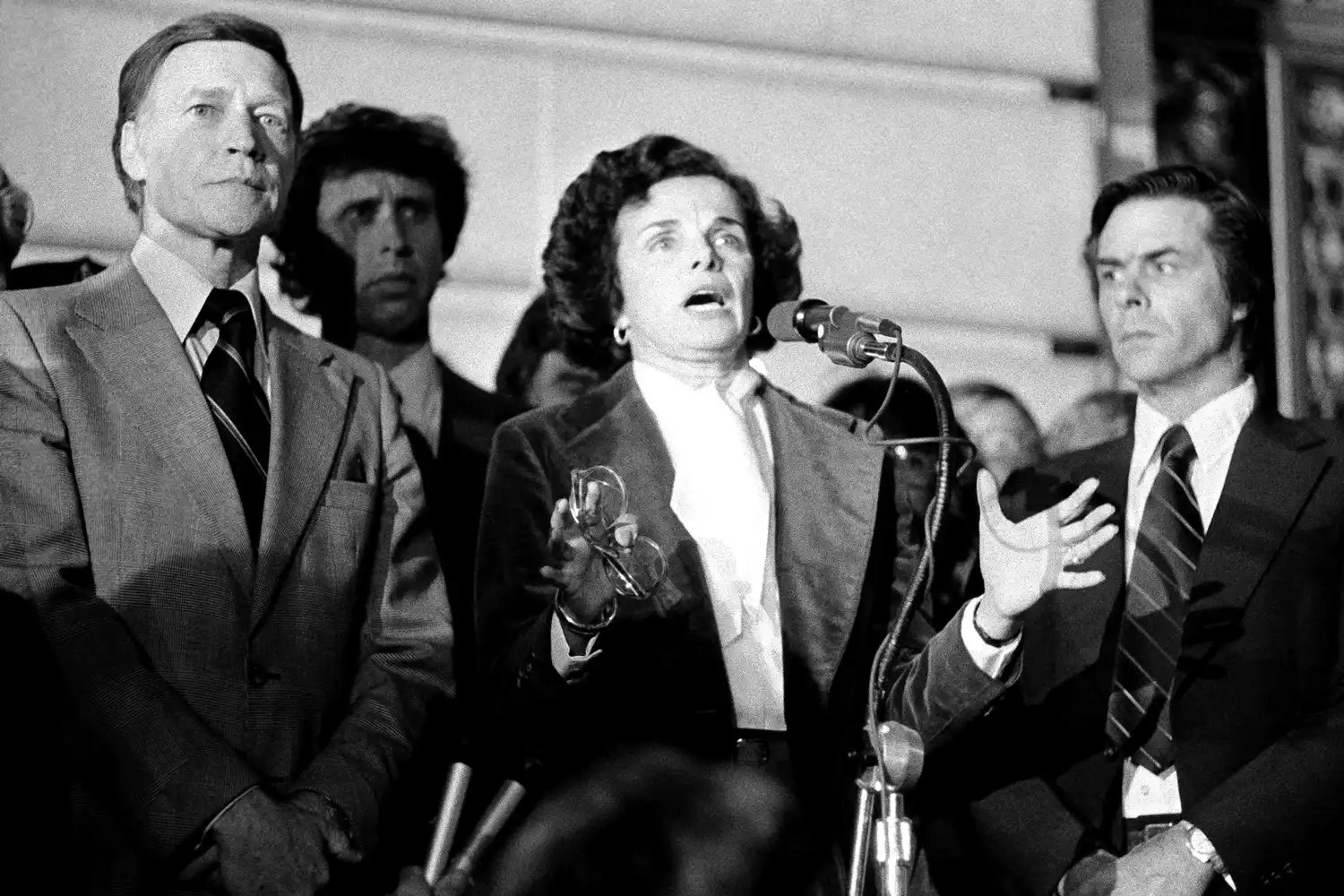Acting Mayor Dianne Feinstein with Police Chief Charles Gain at left, addresses the more than 25,000 people jammed around San Francisco’s City Hall on Nov. 28, 1978.Photo:AP Photo

AP Photo
Sen.Dianne Feinstein, whosedeath at the age of 90was announced on Friday, was the longest-serving female senator in U.S. history and theoldest sitting member of Congress. But that lengthy tenure often masks a national entry into politics that came in the shadow of tragedy.
Feinstein was working in local government in 1978, serving as the San Francisco Board of Supervisors' first female president.
Her tenure in that role drew national attention on Nov. 27 of that same year, when a former San Francisco supervisor, Dan White, assassinated SupervisorHarvey Milkand Mayor George Moscone in City Hall.

Bettmann / Contributor / Getty Images
White had recently resigned from his role as supervisor, citing the low salary, but later attempted to undo that resignation (his attempts failed when a city attorney ruled that his resignation was final). Disgruntled, he snuck into City Hall with a gun and pleaded for Moscone to reinstate him; when Moscone refused, he went on a rampage, first killing Moscone and then Milk.
It was Feinstein who found Milk — an LGBTQ+ pioneer who broke barriers as California’s first gay elected official — dead in his office. As she checked for Milk’s pulse, she would recall, her finger slipped into a bullet hole on his wrist.
“I went down the hall. I opened the wrong door. I opened [Milk’s] door. I found Harvey on his stomach. I tried to get a pulse and put my finger through a bullet hole," she recalled to theSan Francisco Chroniclein 2008. “He was clearly dead … I remember it, actually, as if it was yesterday. And it was one of the hardest moments, if not the hardest moment, of my life. It was a devastating moment. For San Francisco, it was a day of infamy.”
It would also be Feinstein who, moments later, stood at the doors of City Hall to address a shocked crowd with the news of the tragedy.
Footage of that moment shows Feinstein addressing the crowd as onlookers gasped in horror at the news. “It is my duty to make this announcement. Both Mayor Moscone and Supervisor Harvey Milk have been shot and killed,” Feinstein said.
She continued: “The suspect is supervisor Dan White.”
One week after Moscone’s assassination, Feinstein — as president of the Board of Supervisors — became acting mayor of San Francisco.
During her time as acting mayor, Feinstein presided over a city in tumult. When White was convicted of manslaughter, rather than murder, many in the community rioted.
“Twelve squad cars were blown up, the stores were looted, and the gay community just went nuts,” Feinstein would later recall in an interview withThe New Yorker. “The hatred was so big, we really had to bring the bricks of the city together again, and it was difficult.”
She faced other challenges, too, such as serving as mayor after the personal trauma of having experienced the assassinations and taking the place of one of the men (Moscone, whom she had earlier run against and lost) who was killed.
“Look,” she told theChroniclein 2008, “I couldn’t sit in George Moscone’s chair for seven years, and some of it, I think, is that I became mayor as a product of assassination. I had run, and I had not won, and that was a very difficult thing for me to reconcile in my own mind.”
Dianne Feinstein is sworn in as mayor of San Francisco, one week after the assassinations of Mayor George Moscone and Supervisor Harvey Milk.John O’Hara/San Francisco Chronicle via Getty Images

John O’Hara/San Francisco Chronicle via Getty Images
Feinstein would go on to be elected to the role of San Francisco mayor herself in 1979 to 1983.
And the shootings would define Feinstein’s political legacy — not only because she had been there, but because of what she would do years later, when she introduced a ban on assault weapons during her first year in the Senate.
The Assault Weapons Ban of 1994 would eventually be passed, prohibiting the manufacture and sale of semiautomatic guns with military-style features.
The ban expired on Sept. 13, 2004, in accordance with its sunset provision, though Feinstein attempted to pass a similar law in 2013, shortly after the mass shooting atSandy Hook Elementary School.
That measure failed, but the Democrat continued urging lawmakers to place more restrictions on gun, saying in a statement at the time: “Around 30,000 Americans are killed with guns each year; one-third of those are murders. Obviously there’s no single solution, which is why I support a wide range of policy proposals to bring sense to our firearms laws.”
Sen. Dianne Feinstein announces a new bill to ban assault weapons and high-capacity magazines on Jan. 24, 2013.Alex Wong/Getty Images

Alex Wong/Getty Images
But, she added: “If I could have undone the moment, even today, I would have undone it in a second. In a nanosecond.”
To express your opinion on gun reform proposals to your own representatives in Congress, you can look them up and contact them here:congress.gov/members
source: people.com